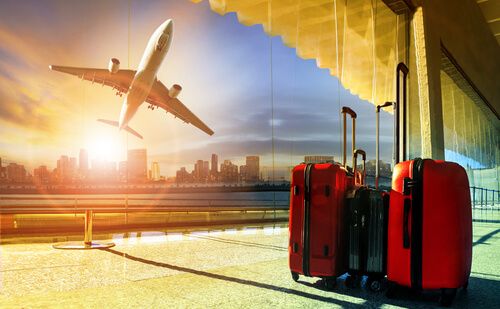
The travel industry has transformed dramatically in recent years. Travelers no longer rely only on local agents or printed brochures. Instead, they explore destinations, compare prices, and book trips online. This shift has created a new opportunity for travel agencies—digital marketing.
Digital marketing helps travel businesses reach a wider audience, showcase travel packages creatively, generate leads, and convert them into bookings. Whether you’re a startup agency or an established brand, digital marketing can be the key to sustainable business growth.
In this blog, we’ll explore how digital marketing can grow travel agency businesses effectively.
1. Search Engine Optimization (SEO): Be Visible Where People Search
Most travelers begin their journey with a search query like “best honeymoon packages” or “cheap flights to Bali.” If your website appears on the first page of Google, you are more likely to get clicks and inquiries.
How SEO helps travel agencies:
- Optimize your website for travel-related keywords.
- Create destination pages like “Things to do in Maldives” or “Top Europe Tour Packages.”
- Improve website speed and mobile-friendliness.
- Write informative blogs, travel tips, and itineraries.
SEO brings organic traffic to your website without spending on ads, helping your agency get long-term leads and visibility.
2. Social Media Marketing: Showcase Experiences, Not Just Packages
Travel is a visual and emotional industry. People are inspired by beautiful photos, videos, and real travel experiences. Platforms like Instagram, Facebook, YouTube, and Pinterest are perfect for promoting travel packages.
How social media helps travel agencies grow:
- Share stunning photos and videos of destinations.
- Post client travel stories, testimonials, and reels.
- Host travel contests or giveaways to increase engagement.
- Use Instagram and Facebook Shops to sell tour packages directly.
Social media helps travel agencies build a community of travel lovers, increase trust, and create brand awareness.
3. Content Marketing: Inspire, Inform, and Convert
Content marketing allows travel agencies to provide value before selling. When you share useful travel content, people trust your expertise and are more likely to book with you.
Types of content travel agencies can use:
- Blog posts like “Top 10 Budget Travel Destinations in Asia”
- Travel guides and itineraries
- YouTube travel vlogs
- Infographics and travel checklists
- FAQs like “How to Apply for a Schengen Visa?”
High-quality content improves SEO, educates customers, and positions your agency as a travel expert.
4. Pay-Per-Click Advertising (PPC): Instant Leads and Bookings
While SEO takes time, PPC advertising brings instant visibility. Travel agencies can run targeted ads on Google, Instagram, Facebook, and YouTube.
Effective PPC strategies for travel agencies:
- Google Search Ads for keywords like “Dubai tour packages.”
- Google Display Ads showing banners on travel websites.
- Facebook/Instagram Ads targeting travelers by age, interests, location, and behavior.
- Remarketing Ads to show ads to people who visited your site but didn’t book.
PPC helps generate quick leads, especially during travel seasons, festivals, or special deals.
5. Email Marketing: Build Relationships and Repeat Customers
Email marketing is one of the most powerful tools for customer retention in the travel industry. With email, you can connect with potential and past clients directly.
Types of emails for travel agency growth:
- Welcome emails after newsletter signup
- Holiday and seasonal offers
- Personalized trip recommendations
- Follow-up emails after inquiry or booking
- Travel tips and visa updates
Automated email campaigns keep your audience engaged, increase loyalty, and drive repeat bookings.
6. Influencer Marketing: Trusted Travel Recommendations
Travel influencers and vloggers have a strong impact on travel decisions. Collaborating with them can help your agency reach thousands or even millions of travel enthusiasts.
How influencer marketing benefits travel agencies:
- Influencers showcase your packages through stories, posts, and vlogs.
- Their followers trust their recommendations.
- You get high-quality photos and videos for social media use.
- Builds credibility and brand visibility.
Micro-influencers (with niche and loyal followers) are great for budget-friendly promotions.
7. Online Reviews & Testimonials: Build Trust and Credibility
Travelers often read reviews before booking. Good reviews can significantly influence a travel agency’s success.
Where to collect and display reviews:
- Google My Business
- TripAdvisor, MakeMyTrip, Yelp, Booking.com
- Social media platforms
- Website testimonial pages
Encourage happy travelers to leave reviews, share photos, or make video testimonials. Positive feedback builds trust and attracts new clients.
8. Travel Apps & WhatsApp Marketing: Connect Directly with Customers
Instant messaging platforms make it easier for travel agencies to communicate with clients.
- Use WhatsApp Business for sending tour details, payment links, and quick customer support.
- Create broadcast lists for sharing offers and updates.
- Use travel apps or client portals for booking tracking, itinerary sharing, and trip reminders.
This creates a seamless and personal customer experience.
9. Analytics & Data-Driven Marketing: Smarter Decisions, Better Results
Digital marketing gives measurable results. With analytics tools like Google Analytics, Meta Insights, and CRM software, agencies can track:
- Website traffic and user behavior
- Most viewed packages and destinations
- Conversion rates and lead sources
- Ad performance and ROI
This helps you understand what works and where to improve.
Conclusion
In today’s digital world, a travel agency cannot rely only on traditional marketing or word-of-mouth. Digital marketing is the roadmap to success. Whether it’s SEO, social media, content, email, or influencer marketing—each tool helps build trust, attract clients, and increase bookings.
By using the right digital marketing strategies consistently, travel agencies can transform their business, reach global travelers, and grow faster than ever.

